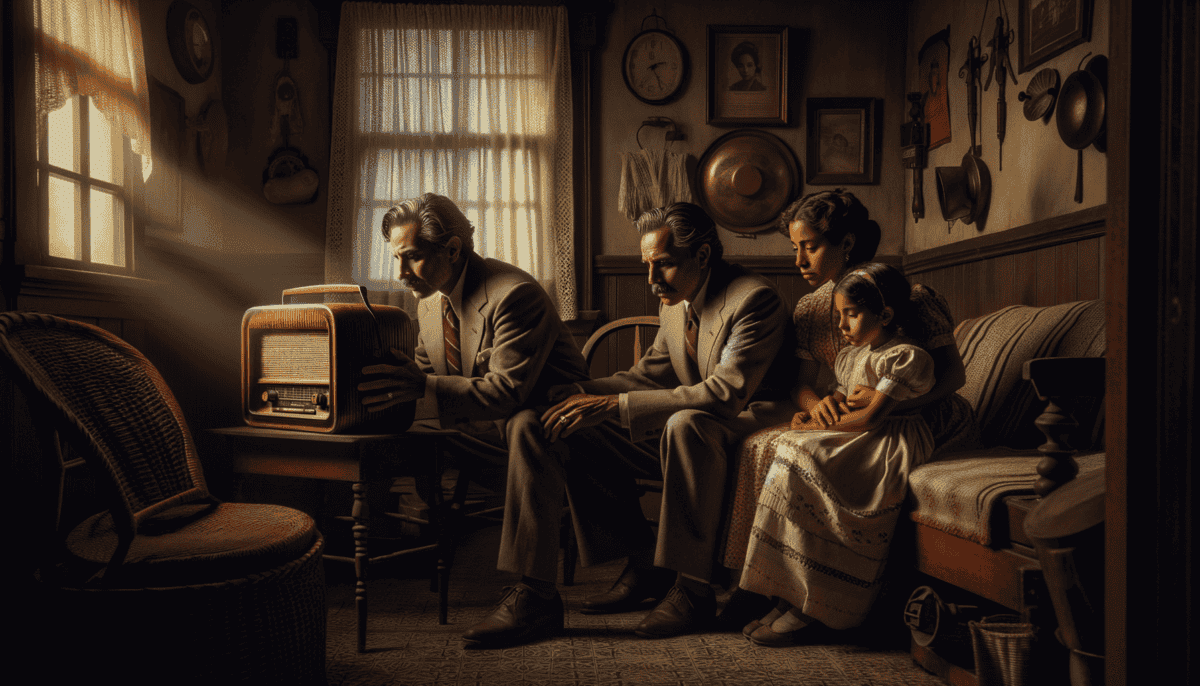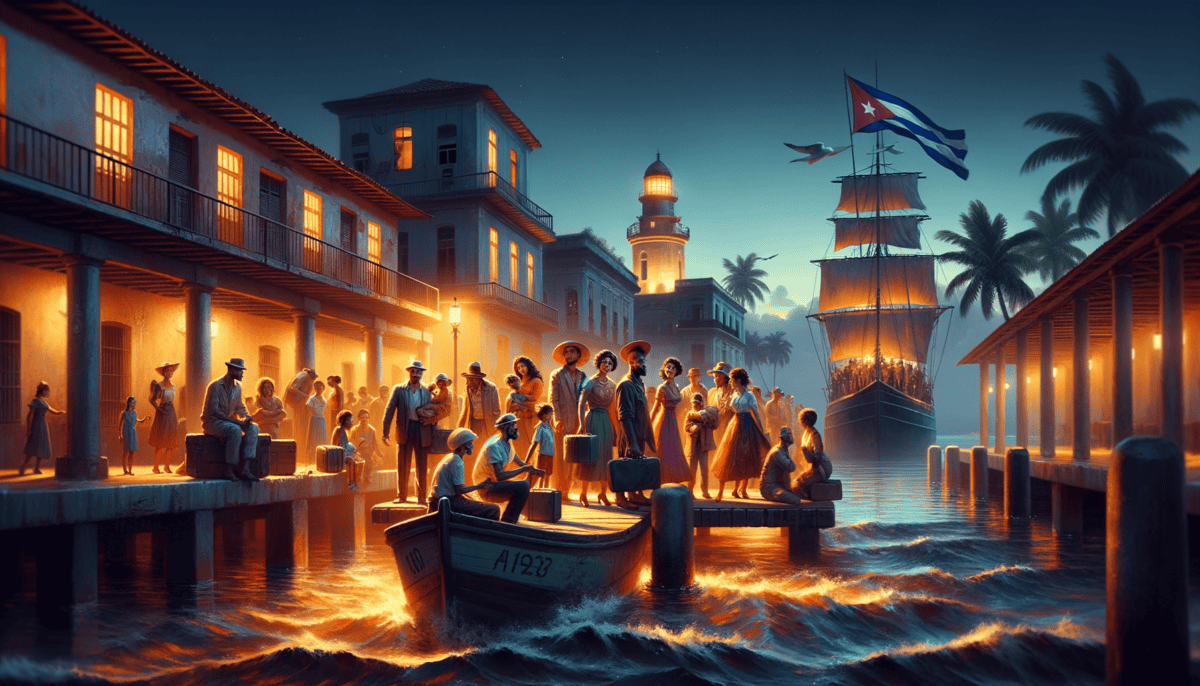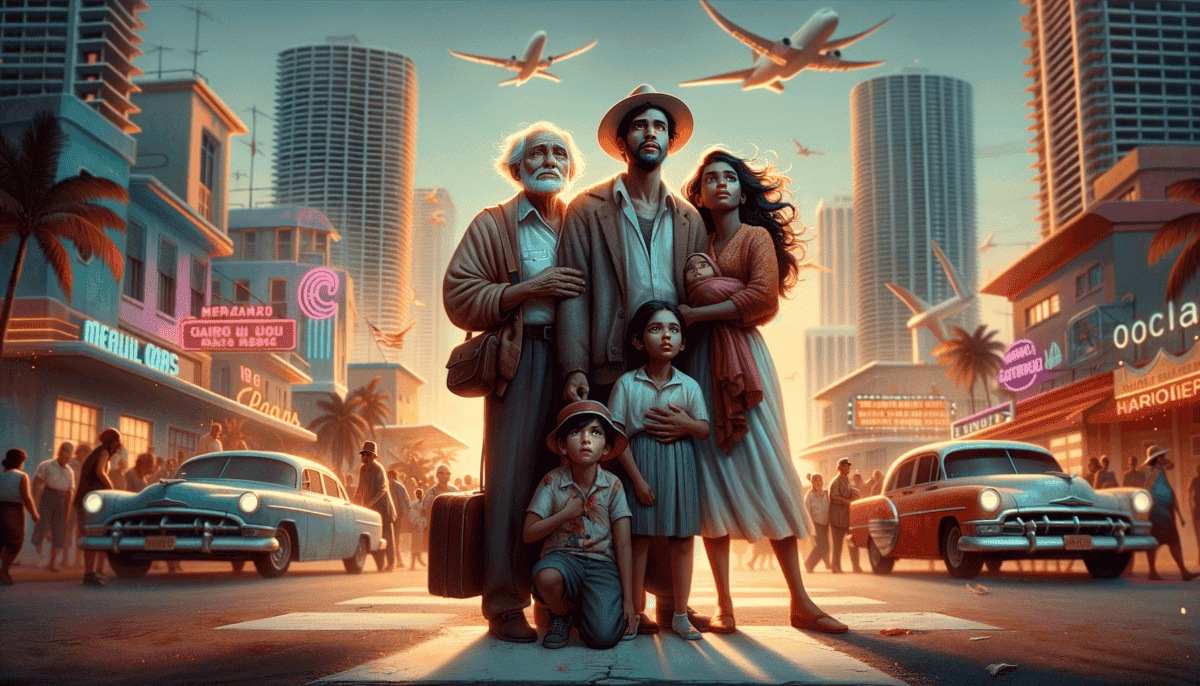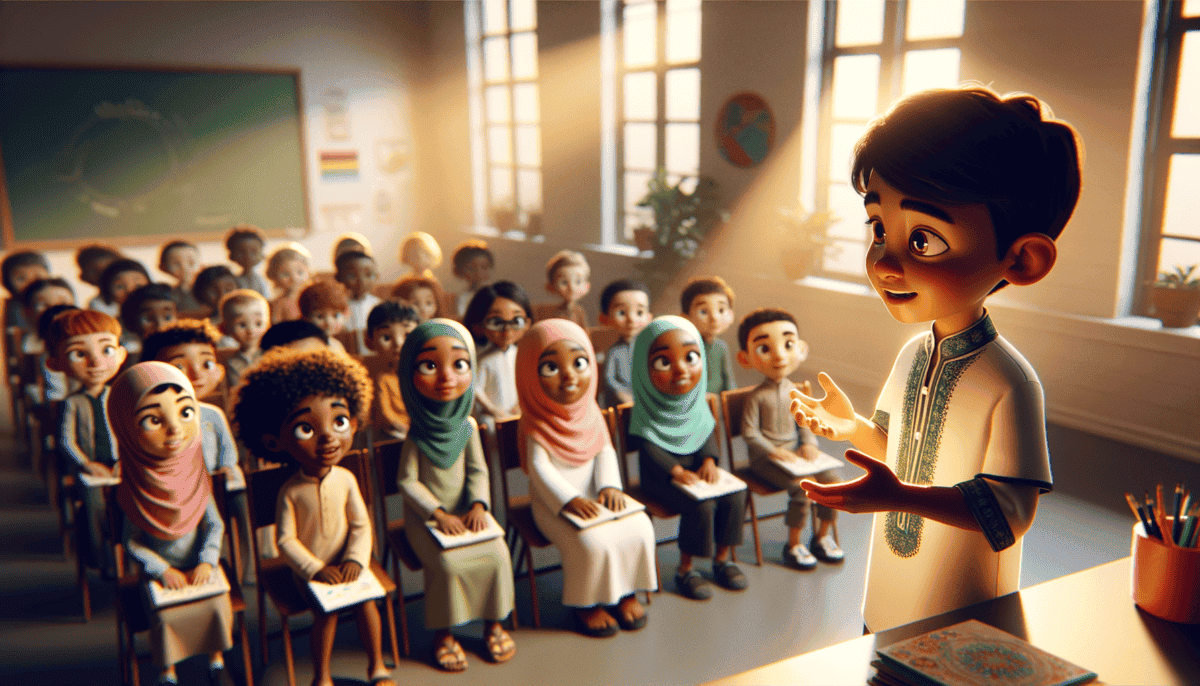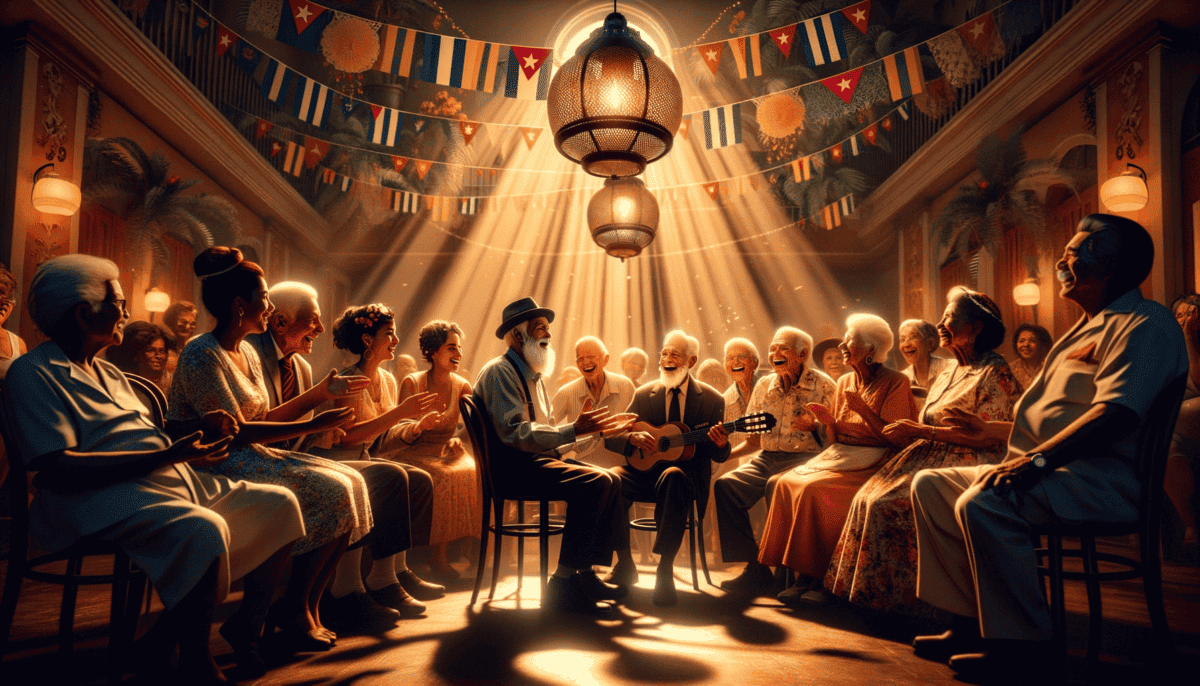Roots of Uncertainty
The sun rose warm and bright over Havana in 1958. Little Maria Rodriguez jumped rope in front of her family's small blue house. She was only eight years old, but she could tell something was different lately. Her papa didn't smile as much anymore.
"Maria, come inside for breakfast!" Mama called from the kitchen window. The smell of fresh Cuban bread and café con leche filled the air.
Inside, Maria's older brother Carlos sat at the wooden table, his face serious as he read the newspaper. Papa stood by the radio, listening closely to the news. The radio crackled with voices talking about someone named Batista and changes coming to Cuba.
"Why is everyone so worried?" Maria asked, spreading butter on her warm bread.
Mama and Papa shared a look. Papa sat down and pulled Maria onto his lap. "Mi amor, our beautiful Cuba is going through some big changes. Some people want a new government."
"Like when I want new shoes?" Maria asked.
Papa laughed for the first time in days. "Not quite like that, pequeña. This is much bigger."
Outside their window, more soldiers walked the streets than before. Maria's best friend Carmen's family had already left for a place called Miami. Other neighbors whispered about boats and leaving too.
That night, Maria heard her parents talking after they thought she was asleep:
"What will we do if things get worse?" Mama whispered.
"We must stay strong for the children," Papa answered. "But we should start saving money… just in case."
The next morning at school, Maria's teacher seemed nervous. Some students' desks were empty. Where was Roberto? And Lucia? Their families had left in the night, the other kids said.
Maria's stomach felt funny. She didn't understand all the grown-up words like "revolution" and "regime," but she knew things were changing. The happy Cuba she knew was starting to feel different.
At dinner that night, Carlos asked, "Papa, will we have to leave too?"
Papa put down his fork. "We don't know yet, mijo. But whatever happens, we will stay together as a family. That's what matters most."
Maria hugged her favorite doll close. She didn't want to leave her home, her school, or her friends. But more than anything, she wanted her family to keep smiling and laughing like before.
That night, while the warm Caribbean breeze blew through her window, Maria said a prayer:
"Dear God, please keep Cuba happy and safe. And please keep my family together, no matter what happens."
The streets of Havana grew quieter as more families disappeared. But inside the Rodriguez house, love stayed strong. They had each other, their memories, and hope for better days ahead. Whatever changes came to Cuba, they would face them together.
Revolution’s Shadow
The new year brought big changes to Cuba. On January 1, 1959, Maria woke up to people shouting in the streets.
“Fidel Castro has won!” voices called out. “Batista is gone!”
At first, many people seemed happy. They danced in the streets and waved Cuban flags. Papa even smiled again. “Maybe things will get better now,” he told Mama.
But as weeks passed, Maria noticed more changes. The candy store where she bought her favorite dulces closed. The owner, Mr. Ramirez, had to give his shop to the government.
“Why did Mr. Ramirez have to close?” Maria asked Papa one night.
Papa sighed. “The new government says they own all the stores now, mi amor.”
Carlos came home from school with new books. “Our teacher says we must learn about the revolution,” he told Maria. “And some of my friends can’t come to class anymore because their families left Cuba.”
One morning, Maria heard Mama crying in the kitchen. The newspaper showed pictures of people being taken away by soldiers.
“What’s happening to our Cuba?” Mama whispered to Papa. “This isn’t the freedom we hoped for.”
More changes came fast:
- Food became harder to find in stores
- People couldn’t say bad things about the government
- Many churches closed
- More families left for America
One night, Papa called a family meeting. Maria had never seen him look so serious.
“Mi familia,” he said, holding Mama’s hand. “I think we must make a very hard choice. Cuba is not safe for us anymore. We need to think about leaving.”
Maria’s eyes got big. “Leave Cuba? But this is our home!”
“Sometimes,” Mama said softly, “we have to leave home to keep our family safe and free.”
That night, Maria couldn’t sleep. Through her window, she watched soldiers walking down their street. A neighbor’s house was dark – the Martinez family had left yesterday. Even her school felt different now, with pictures of Fidel Castro on every wall.
The Cuba that Maria knew was fading away like a sunset. Her happy island home had changed into something that made grown-ups whisper and worry.
Carlos came to sit with her. “Don’t be scared, hermanita,” he said. “Remember what Papa always says – as long as we’re together, we have everything we need.”
Papa spent long nights making secret phone calls. Mama packed a small bag with their most important things. They told Maria and Carlos to keep everything quiet – no telling friends or teachers about their plans.
“When will we go?” Maria asked one evening.
“Soon, mi amor,” Papa answered. “Very soon. We just need to be patient and brave.”
Maria held her doll tight and looked around her room. How many more nights would she sleep here? What would their new home be like? At least she would have her family with her.
Outside, the warm Cuban night was full of whispers. More families were making the same hard choice. The revolution’s shadow had changed their sunny island, and now the time had come to seek the light of freedom somewhere else.
Into the Night Sea
The moonless night wrapped around Maria like a dark blanket. Her heart thumped as Papa led their family to the hidden beach.
“Quiet now, mis amores,” Mama whispered, clutching their small bag of belongings.
Maria could barely see the small fishing boat waiting in the shadows. Her shoes sank into the wet sand with each step. Carlos held her hand tight.
“Remember,” Papa had told them earlier, “we can only take what fits in one bag. But our love and hopes travel with us.”
Saying goodbye was the hardest part. Abuela hugged them so tight Maria thought she might break.
“Mi corazón goes with you,” Abuela said, pressing her rosary into Maria’s hand. “Keep this to remember Cuba.”
The boat captain helped them climb aboard. Ten other people were already squished together on the small boat. Maria recognized her friend Ana from school and her family.
“Look straight ahead,” Papa whispered as they pulled away from shore. “Don’t look back.”
But Maria couldn’t help it. She watched her island home fade into darkness. The warm air turned cool as they went further out to sea.
The journey was scary:
- Big waves made the boat rock
- Everyone had to be super quiet
- The sun was very hot during the day
- They had little food and water
- Some people got sick
Carlos tried to make Maria feel better by pointing out shapes in the clouds. Mama sang soft lullabies when the babies on board started crying.
“Papa,” Maria whispered, “how much longer?”
“Soon we’ll see Florida,” he promised. “Just stay brave, mi pequeña.”
The sea stretched forever in every direction. Maria had never felt so small.
On the second day, the boat’s motor started making funny noises. The captain looked worried.
“Pray,” Mama said quietly, holding Abuela’s rosary.
Just then, they heard a loud sound above them. Everyone looked up to see a big airplane!
“U.S. Coast Guard!” the captain shouted happily. “We’re saved!”
The airplane circled them and soon a big white boat came to help. Kind people in uniforms gave them water and blankets.
“Welcome to America,” a nice lady said in Spanish.
Maria saw Papa cry for the first time ever. But he was smiling too.
As they got closer to Florida, Maria saw tall buildings appearing like magic through the morning fog.
“Look, mi amor,” Mama said, pointing ahead. “That’s Miami. Our new home.”
The sun was rising, painting the sky pink and orange. Maria held Abuela’s rosary tight and thought about their little house in Cuba. She missed it already.
But when she saw how happy Papa looked as he hugged Mama, she knew they had done the right thing. They were together, and they were free.
The big white boat carried them toward the growing shoreline. Other boats full of Cuban families were arriving too. They weren’t alone in their journey to find freedom.
New Beginnings in Miami
The Miami sun felt different from Cuba’s. Maria squinted as she stepped onto American soil for the first time.
“Bienvenidos a Miami,” a friendly man in uniform said. He gave them each a blanket and a sandwich.
“Look, Maria!” Carlos pointed to a TV in the corner. “They have cartoons here too!”
Papa filled out lots of papers while Mama braided Maria’s hair. The nice people helping them spoke Spanish and English mixed together. They called it “Spanglish.”
“Your new home will be in Little Havana,” a lady told them. “Many Cuban families live there.”
“Little Havana?” Maria asked. “Is it like our Havana?”
“It’s a special place where Cuban families keep our traditions alive,” Mama explained.
Their first home was tiny – just two rooms above a busy street. But the neighbors were so kind:
- Mrs. Rodriguez brought them Cuban coffee
- The Garcia family shared their dinner
- Mr. Perez helped Papa find work
- Ana’s family lived next door
- Everyone helped each other
The streets of Little Havana were full of life! Music played from open windows. Old men played dominoes in the park. The smell of fresh bread and coffee filled the air.
“Mira!” Carlos said excited. “They sell paletas just like at home!”
But some things were very different. Maria had to learn new words in English:
“Hello” instead of “Hola”
“Thank you” instead of “Gracias”
“School” instead of “Escuela”
Her first day of school was scary. Maria didn’t understand much of what the teacher said. But her new friend Jenny helped her learn.
“Don’t worry,” Jenny said. “My family came from Cuba last year. It gets easier!”
Papa worked two jobs to buy food and pay rent. He came home tired but always had a smile for his family.
“Look what I got!” he said one day, holding up shiny new books. “For you to learn English!”
Mama found work sewing dresses. At night, she taught Maria and Carlos about Cuba so they wouldn’t forget.
“We may live in America now,” she said, “but Cuba will always be in our hearts.” ❤️
Every Sunday, they went to church where many Cuban families gathered. After mass, everyone shared stories and food in the park.
“See?” Papa said, watching Maria play with her new friends. “We have two homes now – Cuba in our memories and America in our future.”
Maria held Abuela’s rosary and smiled. She missed Cuba, but America was starting to feel like home too.
Growing Up Cuban-American
Ten years had passed since Maria’s family arrived in Miami. Now a teenager, Maria watched her little brother Carlos practice his English presentation.
“My family came from Cuba,” Carlos said proudly. “We brought our culture with us!”
“Mija, come help me in the kitchen,” Mama called. Maria loved cooking Cuban food with her mother.
“When I was your age in Cuba,” Mama said, “my mama taught me these recipes too. Now you’ll teach your children someday.”
Maria spoke perfect English now, but Spanish was still special. It was their home language, their heart language. At school, her friends came from many places:
- Jenny from Cuba
- Miguel from Puerto Rico
- Sarah from New Jersey
- David from Haiti
- Lisa from California
Papa had become a business owner! His small Cuban restaurant made people happy. “Food brings people together,” he always said. ️
Every weekend, Maria helped at the restaurant. American customers loved learning Spanish words:
“Delicioso!” they’d say after tasting Papa’s cooking.
“¡Gracias!” they’d practice with big smiles.
In her room, Maria had two flags – Cuban and American. Both meant home to her now.
“Being Cuban-American is special,” her teacher Mrs. Rodriguez said. “You have the best of both worlds!”
Carlos won first place in the school talent show dancing salsa. His American friends begged him to teach them.
“See?” Maria told him. “Our culture is like a gift we can share.”
At college fairs, Maria dreamed big. No one in their family had gone to college in Cuba, but here she could be anything!
“Maybe I’ll be a doctor,” she told Papa. His eyes got wet with happy tears.
“In America, mi amor, you can reach for the stars,” he said. ⭐
Their neighborhood changed too. Now there were Vietnamese restaurants next to Cuban cafes. Mexican music played near Italian stores.
“America is like a big family,” Mama said. “Everyone brings something special.”
The old photos from Cuba stayed on their wall. But new ones joined them – Maria’s graduation, Carlos’s baseball games, their new house, Papa’s restaurant.
One day, Maria found Mama looking at the photos. “Do you miss Cuba?” she asked.
“Every day,” Mama said softly. “But look at the beautiful life we built here. We carry Cuba in our hearts while making America our home.” ❤️
That night, as salsa music played from their porch, Maria watched American kids dancing with Cuban kids. Their two worlds had become one.
A Legacy of Hope
Twenty years after their journey across the sea, Maria stood proud in her doctor’s coat. Her dream had come true! ⚕️
At her medical office in Miami, she helped people from everywhere. The walls showed both her medical degree and a small Cuban flag.
“Remember when we first came?” Papa asked at Sunday dinner. “Now look at us!”
“We didn’t just find freedom,” Mama said, stirring her famous black beans. “We found a new way to be Cuban while being American too.”
Maria’s little girl Sofia played with her cousins in the backyard. They spoke Spanglish – mixing Spanish and English words like colorful paints:
- Abuela’s stories about Cuba
- American birthday parties
- Cuban Christmas traditions
- School plays in English
- Songs in both languages
The whole family helped other new people coming to America. They remembered how hard it was at first.
“Being kind makes America stronger,” Carlos told his students.
At Papa’s biggest restaurant, pictures told their story:
The tiny boat that brought them
Their first small apartment
Maria’s medical school graduation
Carlos with his teacher award
The whole family, growing and smiling
One special day, Maria took Sofia to the ocean. The waves sparkled like they did years ago.
“This water connects us to Cuba,” Maria said. “It carried our dreams here.”
Sofia drew pictures of both her worlds:
Palm trees and snow
Baseball and dominoes
Apple pie and flan
At the yearly Cuban festival, Maria saw many families like hers. Some came long ago, some just arrived. All shared stories of courage.
“Our story isn’t just about leaving Cuba,” Maria told Sofia. “It’s about building bridges between two wonderful places.”
That evening, three generations danced in Papa’s restaurant. Old Cuban songs mixed with new American ones. The walls held flags from many countries.
“Look what grew from our brave journey,” Mama said, watching Sofia teach her American friends to dance salsa.
Maria hugged her parents tight. Their dream of freedom had grown into something even bigger – a beautiful mix of old and new, there and here, then and now.
As the sun set over Miami, turning the sky orange and pink, Maria knew their story would keep growing. Through their children, their love, their courage, and their hope – they had built more than just a new life.
They had built a bridge of dreams that would last forever. ⭐


